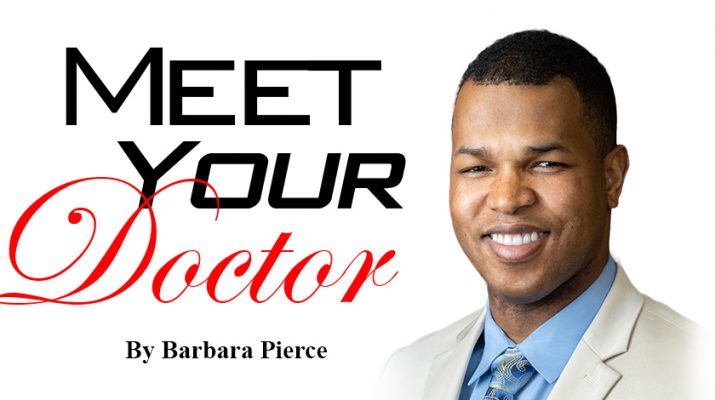Medical director of the Hernia Center, Weight Loss Center, and Wound Centers at Rome Health recently performed some of the first minimally invasive weight loss surgeries ever done at the facility.
By Barbara Pierce
Physician Keneth Hall II is medical director of the Hernia Center, Weight Loss Center, and Wound Centers at Rome Health. He has been instrumental in bringing minimally invasive surgical techniques to the forefront in the region. Additionally, he recently performed some of the first minimally invasive weight loss surgeries ever done at the facility.
Q. How did you become interested in becoming a physician?
A. As a child, I witnessed my uncle who suffered tremendously with a chronic illness. I was able to see the love, care and compassion that his doctor offered. Many patients waited hours on end just to be seen by her. She was my inspiration. Also, when I was in high school, I read a book called “Gifted Hands” by Dr. Ben Carson [the physician who ran in the presidential election in 2016]. I saw a parallel between his life and mine, and began to dream of a career as a surgeon.
Q. As a bariatric surgeon, what kind of surgical procedures do you do?
A. We offer surgeries for obese patients including Roux-en-Y gastric bypass surgery, sleeve gastrostomies, and corresponding revisions. We also offer a full complement of general surgical procedures, including hernia repairs, gallbladder surgeries, stomach and colon surgeries as well as procedures to repair hiatal-diaphragmatic hernias in patients with heartburn-GERD or Barrett’s esophagus.
Q. You’ve been a leader in bringing minimally invasive surgical techniques to the Mohawk Valley. What are “minimally invasive” surgical techniques?
A. I pride myself on doing state-of-the-art surgery, using minimally invasive techniques such as laparoscopy and robotic surgery. These surgeries are efficient, reduce pain, reduce complications and reduce recovery time. In laparoscopic surgery, I make several small cuts. Usually, each one is no more than a half-inch long. I insert a tube through each opening, and the camera and surgical instruments go through those to perform the operation. Robotic surgery includes a camera arm and mechanical arms with surgical instruments attached to them. I control the arms with a computer which gives me a high-definition, magnified, 3D view of the surgical site.
Q. What areas of your practice are you especially drawn to?
A. I’m especially drawn to obesity medicine. Severe obesity is a chronic condition. It’s difficult to treat through diet and exercise alone. Surgical intervention has been shown to be more effective than nonsurgical interventions for sustained weight loss. For this surgery to be successful, patients must be dedicated to a life style change and lifetime of follow-up appointments.
Q. What is most rewarding about your practice?
A. The dramatic changes brought about in people’s lives after surgery is the most rewarding thing about it. Medical problems, such as diabetes, high blood pressure, acid reflux and many other medical conditions may resolve after weight-loss surgery.
Q. You have been awarded many honors. What achievements or awards are you most proud of?
A. The Marquis Who’s Who Award by Millennium Magazine and magazine cover feature. [Editor’s note: The prestigious Marquis Who’s Who chronicles the lives of the most accomplished individuals in America.] I’m also proud to have received the Forty Under 40 award and the New York Times Rising Star award.
Q. What else would you like us to know about you?
A. I would like to be remembered as a testament that, with a little determination, a big plan and much hard work, you can accomplish anything. I recognize that the playing field is not always level and believe that opportunity is what truly separates us from success. I believe wholeheartedly that it is the responsibility of the successful to educate and mentor those who will come in our place. I do that by making motivational talks and commencement addresses. I’d also like people to know that, here at Rome Health, our approach is different from most. We use a family approach; we give individual attention to each patient and focus on the ways in which quality of care is delivered. I see my patients as an extension of my family and I want only the best for them. I try to put myself in the patient’s shoes, so I can be more sensitive to what they’re going through.
Q. How do you find living in the Mohawk Valley?
A. I find it’s a calming environment — being one with and so close to nature. Also, I like that people are very appreciative of the care I offer. And it’s a great place to raise children.
Lifelines
Birth year: 1976
Birth place: Jamaica
Current residence: Cazenovia
Education: Undergraduate degree: York College of the City University of New York, where he received several awards for academic excellence and graduated with honors. Medical degree: Howard University College of Medicine. Internship: US Department of Health and Human Services. General surgery training program: Stony Brook University Hospital. Surgical fellowship: NYU Long Island.
Affiliations: Rome Health, St Joseph’s Health
Hobbies: Jogging, hiking, golfing, playing tennis. “I’m an inventor and a publisher, and I volunteer. I enjoy doing public speaking, such as commencement speeches and motivational talks.”

